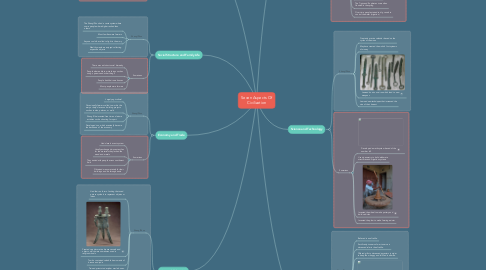
1. Governement and Leaders
1.1. Shang/Zhou
1.1.1. The Zhou introduced the idea of the Mandate of Heaven, which stated that the gods would support a just ruler and would not allow anyone corrupt to come to power
1.1.2. At their capital city, their kings were surrounded by a court, or gathering of wealthy nobles, who performed rituals intended to strengthen the kingdom
1.1.3. The king appointed governors to rule distant parts of the kingdom to ensure order
1.1.4. The king had a large army at his disposal to fight opponents as well as prevent rebellions
1.2. Sumerians
1.2.1. Priests held a high status and initially governed the city-states
1.2.2. Eventually war chiefs began to rule as kings once the city-states battled for dominance
1.2.3. The kings served as the gods' chief representatives, and performed ceremonies to please them
1.2.4. The kings formed dynasties or a series of rules from one family to keep order
2. Social Structure and Family Life
2.1. Shang/Zhou
2.1.1. The Shang/Zhou had a caste system where some people where higher ranked than others
2.1.2. Most families were farmers
2.1.3. Anyone could be called to fight in the army
2.1.4. Wealthy members enjoyed collecting expensive objects
2.2. Sumerians
2.2.1. There was a distinct social hierarchy
2.2.2. People where able to write things such as songs, poems and other things
2.2.3. People had their own houses
2.2.4. Most people were farmers
3. Economy and Trade
3.1. Shang/Zhou
3.1.1. Largely agricultural
3.1.2. Occasionally farmers called to work in the army or help slaves on building projects such as tombs, palaces, or walls
3.1.3. Shang Elite invested free time on leisure activities such as hunting for sport
3.1.4. Developed iron, which eventually became the backbone of the economy
3.2. Sumerians
3.2.1. Had slaves/ a cast system
3.2.2. Usually exchanged woven textiles for the materials they lacked like wood and metals
3.2.3. They traded with people across southwest Asia
3.2.4. Obtained many materials for their buildings and art through trade
4. Arts and Education
4.1. Shang/Zhou
4.1.1. Had their on form of writing that used picture symbols to represent objects or ideas
4.1.2. Created very decorative bronze vessels and objects, which were sometimes used in religious rituals
4.1.3. Tombs contained valuable items made of bronze and jade
4.1.4. Trained priests to decipher oracle bones.
4.2. Sumerians
4.2.1. Had a form of schooling/teaching for scribes
4.2.2. Had their own form of writing called cuneiform
4.2.3. Wrote stories, poems, and songs
4.2.4. Carved cylinder seals out of small stones as a way to "sign" documents or show ownership
5. Geography and Agriculture
5.1. Shang/Zhou
5.1.1. Had long rivers, fertile soils, a temperate climate, and isolated valleys
5.1.2. Mountains and deserts protected from invasion
5.1.3. Isolation allowed civilization to develop undisrupted
5.1.4. Combination of rivers and fertile soil for planting allowed civilization to thrive
5.2. Sumerians
5.2.1. In the Fertile Cresent, by the Pursian Gulf
5.2.2. The land was flat and swampy
5.2.3. The Tigris and Euphrates rivers often flooded in the spring
5.2.4. Over time people started to dig canals to control the water (irrigation)
6. Science and Technology
6.1. Shang/Zhou
6.1.1. Created a precise calendar based on the cycles of the moon
6.1.2. May have created the world's first systems of money
6.1.3. Learned how to use iron which lead to new weapons
6.1.4. Learned new techniques that increased the size of their harvest
6.2. Sumerians
6.2.1. Developed a math system based of the number 60
6.2.2. Used geometry to build elaborate structures and irrigation systems
6.2.3. Invented the wheel to make pottery and build vehicles
6.2.4. Invented the plow to make farming eaisier
7. Religion
7.1. Shang/Zhou
7.1.1. Believed in an afterlife.
7.1.2. Sacrificed prisoners of war to serve a deceased ruler in the afterlife.
7.1.3. Offered gifts to deceased ancestors in order to keep them happy and fulfilled in afterlife.
7.1.4. Sought advice from ancestors through 'oracle bones' composed of inscribed bits of animal bone or turtle shell. Hot metal was applied to the bone resulting in cracks and could be deciphered by a priest once formed.
7.2. Sumerians
7.2.1. Had temples with a ziggurat, a pyramid-shaped structure that rose to the sky, in the center.
7.2.2. Practiced Polytheism, or the worship of many gods.
7.2.3. Believed gods controlled all natural forces and could bring rich harvests or raging floods.
7.2.4. Worked hard to please the gods. Held ceremonies and offered food and drink to satisfy the gods.

